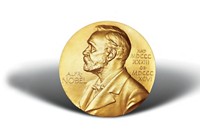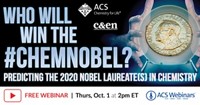Advertisement
Grab your lab coat. Let's get started
Welcome!
Welcome!
Create an account below to get 6 C&EN articles per month, receive newsletters and more - all free.
It seems this is your first time logging in online. Please enter the following information to continue.
As an ACS member you automatically get access to this site. All we need is few more details to create your reading experience.
Not you? Sign in with a different account.
Not you? Sign in with a different account.
ERROR 1
ERROR 1
ERROR 2
ERROR 2
ERROR 2
ERROR 2
ERROR 2
Password and Confirm password must match.
If you have an ACS member number, please enter it here so we can link this account to your membership. (optional)
ERROR 2
ACS values your privacy. By submitting your information, you are gaining access to C&EN and subscribing to our weekly newsletter. We use the information you provide to make your reading experience better, and we will never sell your data to third party members.
Nobel Prize
Chemists predict who will win the 2021 Nobel Prize in Chemistry
Bioorthogonal and click chemistry, mRNA vaccines, and controlled radical polymerization among the webinar predictions for who will take home chemistry’s big prize
by Laura Howes
September 30, 2021
UPDATE: The 2021 Nobel Prize in Chemistry has been awarded to Benjamin List and David W. C. MacMillan for their work pioneering asymmetric organocatalysis. Read our story here.
Ahead of this year’s Nobel Prize announcements, C&EN and ACS Webinars again invited chemists from around the world to join in on some good-natured speculation about who might get a call from Stockholm on Wednesday. Data-driven decisions and old-fashioned gut feeling were on display during the hour-long webinar held Thursday, Sept. 30.
Angela Zhou, a data scientist at CAS, Andrés Cisneros of the University of North Texas, Rigoberto Hernandez of Johns Hopkins University, and Frank Leibfarth of the University of North Carolina at Chapel Hill joined C&EN Senior Editor Laura Howes for the event. The panelists discussed who might win now that several longtime favorites are out of the running because they have won in recent years. Zhou presented an analysis of publications, citations, and keywords that CAS used to make predictions.
In 2019, webinar viewers correctly predicted that longtime favorite John B. Goodenough and colleagues would win for lithium-ion batteries. The 2020 winners, Emmanuelle Charpentier and Jennifer A. Doudna, were also tipped for several years for their invention of the gene-editing system CRISPR. This year, the webinar vote went to Katalin Karikó and others for work enabling mRNA vaccines. The panelists and audience think that the ongoing pandemic will influence the nominations and the final decision next week.
The pandemic will also affect how the Nobel Prizes are celebrated. Instead of the new laureates all traveling to Stockholm in December, the ceremonies will travel to the laureates with the prizes being handed over by Swedish diplomats closer to each winner’s home. The full week of celebrations will be a mix of in-person and online events.
The #ChemNobel webinar isn’t the only place where chemists are making their predictions about who will take part in these celebrations. For example, Clarivate’s Web of Science analysis suggests three possible winners: free-radical chemistry specialist Barry Halliwell; computational chemistry pioneer William Jorgensen; and Mitsuo Sawamoto, developer of metal-catalyzed living radical polymerization. Meanwhile, scientific society Sigma Xi has been hosting an “October Madness” knock-out competition. As C&EN went to press, Carolyn Bertozzi was fighting it out with Omar Yaghi and Makoto Fujita to win that competition.
In Europe, ChemistryViews magazine also polled its readers for their predictions, with the highest number of suggestions going to Shankar Balasubramanian for his work on nucleic acids, and to Omar M. Yaghi, known for metal-organic frameworks (MOFs) and covalent organic frameworks. MOFs also scored well in the Twitter poll run by Nature Chemistry Editor Stuart Cantrill, who has joined the C&EN predictions webinar in the past. However, bioorthogonal and click chemistry took the largest share of the votes this year.
The Nobel Prize Committee will announce the chemistry prize winners Oct. 6. Check in with C&EN next week to see if any of the predictions come true. We will be posting coverage of all of the science Nobel Prizes on our website, Twitter, and Facebook.





Join the conversation
Contact the reporter
Submit a Letter to the Editor for publication
Engage with us on Twitter